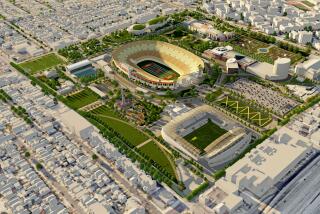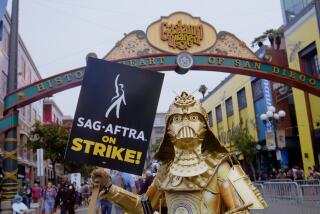Expo ‘86: It Was Great Fun but It Didn’t Fulfill Hopes for Economy
- Share via
VANCOUVER, Canada — It was quite a party, six months of everything from opera to Czech food. Expo ‘86, Canada’s latest world fair, is over, and people here wonder if what they feel is satisfaction or a hangover.
The fair, which closed two weeks ago, was the child of William Bennett, the former premier of British Columbia, who predicted that it would rejuvenate the province’s tottering economy with increased tourism and turn Western Canada into an international center of finance, trade and high technology.
Another clear but unspoken goal for Bennett was to parlay Expo into political advantage for his conservative Social Credit Party, which had been losing support for failing to overcome an economic recession with an unemployment rate of more than 12%.
Although Expo’s backers still defend the massive project, which cost an estimated $1.2 billion and is likely to have incurred a deficit of about $230 million, the expections of many people are falling about as fast as the prefabricated buildings that housed the exhibits.
“I’ve always said Expo would be a burp in the history of Vancouver,” said Mayor Mike Harcourt, an erstwhile critic who ultimately sold his support for millions of dollars in city improvements but now finds the fair almost inconsequential.
“Nobody likes to see a party end,” he continued, “but now we have to look to the future, and not the last six months.”
Still, Expo’s organizers, some local businessmen and the Socreds, as members of the Social Credit Party are called, want to do some bragging.
On the surface, they have reason to do so. More than 22 million people paid to see the pavilions put up by 32 countries, three American states and 11 Canadian provinces and territories.
The six months of the fair passed almost without problems, and surveys of people who attended reflect great enthusiasm.
The fair’s official theme was transportation and communications, but the entertainment ranged from Soviet ballet companies to La Scala opera company of Milan to TV actor and comedian Howie Mandel. There were 3-D movies, spectacular roller coasters, a 1,000-foot free-fall in a large bucket and food from around the world.
“It was a good show,” Expo spokeswoman Gail Fliton said. “It was successful. At least the people of Vancouver thought so, since 340,000 came down for the last day, just to say goodby.”
And after Bennett unexpectedly retired as premier, his Socred successor, William Vander Zalm, called new elections on the basis of what polls indicatUnfulfilleded was the party’s increased popularity arising out of Expo.
Another winner was Jimmy Pattison, the self-made millionaire who headed the Expo effort, running it for a salary of $1 a year.
Despite the salary, which he says he never collected, Pattison came out all right. According to press accounts, several firms owned by the Expo president won lucrative fair contracts, including work for neon signs and the official Expo guide.
Details of these deals are cloudy because Pattison, who runs his own affairs on the expressed theory that what he does is nobody’s business, ran Expo on the same principle, even though as a government corporation Expo is legally bound to disclose all operations.
Expo is 18 months late in publishing one of its scheduled financial reports, much less the final figures. So no one knows for sure exactly how much money was spent, how much was taken in and how much is owed. Whatever the figures, Pattison has said, the deficit will be paid off from the proceeds of a lottery that otherwise would have gone to public education.
Almost No Outcry
There has been almost no outcry against any of this, largely because a deficit was built into Expo’s planning. In fact, the final deficit will in all likelihood be far lower than the originally estimated shortfall of $300 million. Pattison deliberately underestimated the number of paying visitors by nearly 10 million, according to a city official.
Still, if there is no real controversy over the way that Expo was run, there is serious debate about the impact it has had, or will have, on Vancouver and British Columbia.
According to Mayor Harcourt, who is leaving office this month for a seat in the provincial legislature, the most positive aspects of the fair will be the bridges, buses and other municipal improvements, and the use of the fairgrounds for urban development.
However, he said in an interview, most of the claimed benefits in terms of increased international investment and tourism would have come about anyway.
“Most of the growth was already under way before the fair was planned,” Harcourt said. “At best, Expo merely accelerated the trend. . . . Vancouver already generated 67,000 of the latest 86,000 jobs created in B.C. . . . It is a tacky attitude to assume that a six-month fair will drive the economy.”
This skepticism is shared by Graham Clarke, a businessman and president of the Vancouver Board of Trade. Clarke, who acknowledges that several companies he runs in the tourism sector profited from Expo, said in an interview that the world’s fair “was no great cure-all” for the province’s continuing economic ills.
“Regarding Vancouver,” Clarke said, “it’s a chicken-and-egg situation. Vancouver was already on the edge of (an economic) breakthrough.”
He and the mayor were talking about a perception that the city, with its mild climate, international outlook and livable conditions, is automatically in a good position to take advantage of increasing interest by and trade with Asia and the Pacific Rim countries.
Bound to Happen
“Improvement was bound to happen,” Clarke said, and “Expo didn’t start new thinking, but it did focus and reinforce” the trend.
Beyond undermining the claims of economic renewal, other critics cast doubt on specific claims that Expo created new jobs and will lead to even more employment through a promised increase in tourism.
Indeed, although upward of 50,000 people were employed at one stage of the fair or another, British Columbia’s unemployment rate in August, at the height of Expo’s operation, actually increased marginally to 12.3%, the second-highest in Canada.
Robert Anderson, an anthropologist and professor of communications at Simon Fraser University in Vancouver, says that even an increase in tourism as a result of Expo would be of little real benefit.
“The tourist industry is largely unskilled and low-paid,” he said in an interview, adding that “there is no evidence that it is a wonderful economic machine.”
Anderson, who edited a book on Expo, said that “only by sleight of hand is there any connection between Expo and an improved outlook for British Columbia.”
There is a real danger, he said, that the focus on tourism will detract from significant policies that could help the province, specifically a modernization of British Columbia’s traditional natural resource base.
“There is no strategic thinking by Vander Zalm, and I doubt that he can pull another rabbit out his hat,” Anderson said.
Some Negative Impact
There is evidence that in the short run, Expo even had some negative impact on the local economy. Several restaurants, theaters and other small businesses were seriously hurt because local residents as well as visitors shunned them, preferring the entertainment and food at the fair site, or were too exhausted after a day of walking around the 250-acre area to seek out more entertainment and food.
The dozens of cheap hotels that evicted hundreds of poor clients in the hope of drawing better-paying tourists found that the gamble did not pay off.
According to James Green, head of the nonprofit Downtown East Side Residents’ Assn., many of the hotels were trying to lure back their former residents before Expo was over.
He said one hotel that evicted all its regular clients “lost a whole week’s booking because a fireman who was part of an American tour said it was a firetrap.”
A walk through the down-at-the-heels neighborhood where most of the cheap hotels are located indicated that many who had gambled on building a permanent tourist business were back to advertising for pensioners and other low-income residents.
More to Read
Sign up for Essential California
The most important California stories and recommendations in your inbox every morning.
You may occasionally receive promotional content from the Los Angeles Times.













